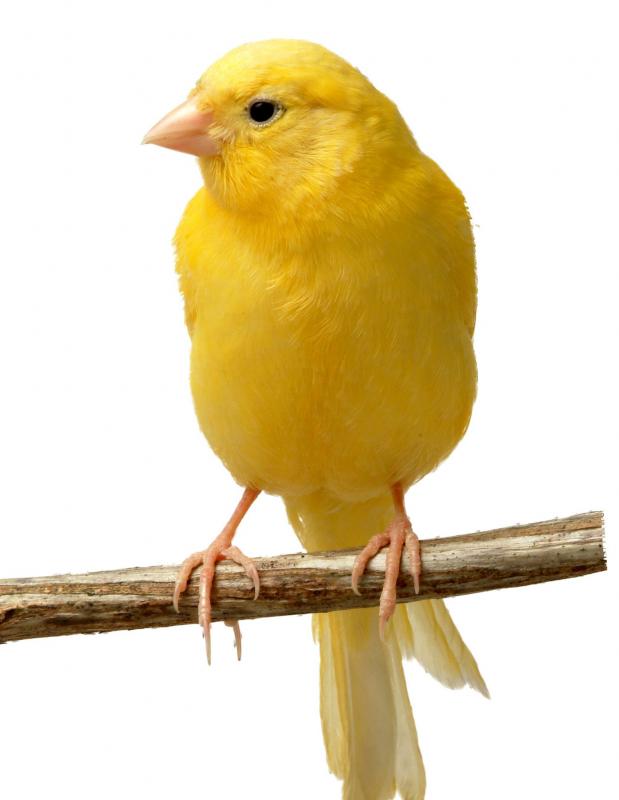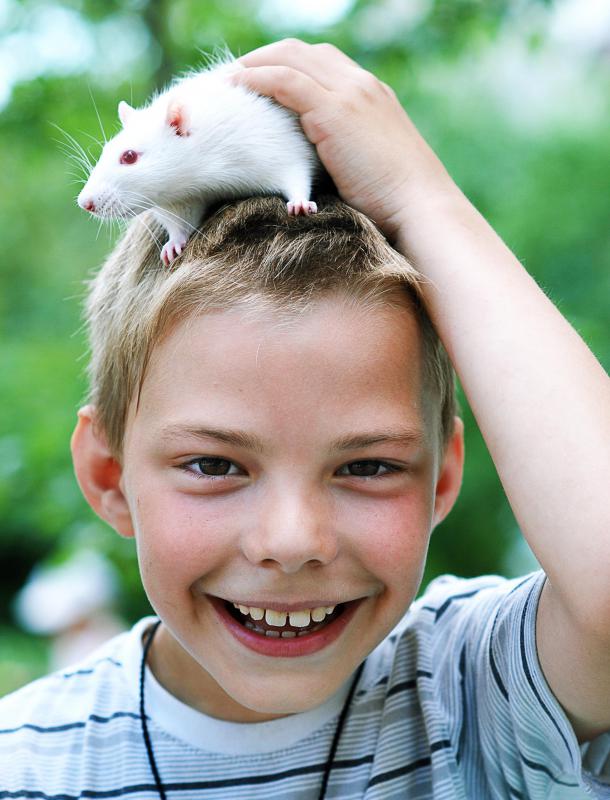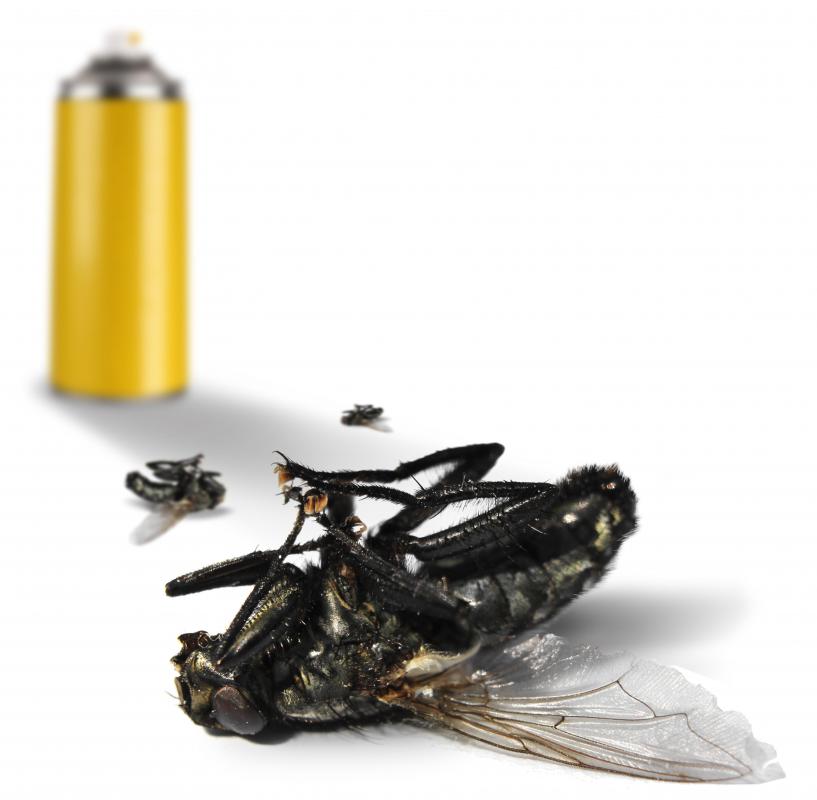At AllThingsNature, we're committed to delivering accurate, trustworthy information. Our expert-authored content is rigorously fact-checked and sourced from credible authorities. Discover how we uphold the highest standards in providing you with reliable knowledge.
Is Bug Spray Safe for Pets?
Pets and certain bugs have well-known associations. Fleas plague cats, dogs, and even sometimes rats, and mosquito bites can transmit things like heartworm to dogs. Animals should not be flea infested, or be susceptible to ticks and mosquitoes, but bug spray may not be the best way to go about helping your pet remain free of bugs.
The question of whether bug spray is safe for pets deserves some attention. First, is the bug spray one intended for animals? Is it intended as an insect repellent for humans? Alternately, is the spray a pesticide you’re spraying in your house or on plants to kill bugs? There are so many different types of bug sprays on the market that you can’t simply give a yes or no answer to this question.

Some bug sprays for animals are perfectly safe, though you should consult a vet when you plan to use any products on your pets. Some have naturally based ingredients but this doesn’t necessarily make them safe. Products containing tea tree oil and pennyroyal may be sold as natural bug spray for pets, but they haven’t been proven particularly effective, and they do have potential health risks for cats and dogs.

Most bug sprays for pets that are not manufactured as “natural” have distinct warnings on them about using with care. It’s a good idea to consider whether a spray, which can be inhaled by both you and your pet, is really a good way to go if the spray claims hazards to people and pets. Insect repellents for humans, such as products containing DEET should never be used on your pets.

DEET is especially dangerous to animals and may cause them to develop neurological conditions. If you want to use DEET on yourself, use it when you are far away from your pets, and consider lotion rather than bug spray forms which won’t act as inhalants. Any other contact between the lotion or bug spray containing DEET and your pet should be avoided.

Bug sprays used in the home to kill bugs are often toxic. If you’re using sprays to get rid of cockroaches, ants or the like, you should remove your pet from the home while you use them. It is safer to use animal trapping mechanisms or products like ant stakes, providing your animal can’t get at them. There is considerable concern about the use of most chemical pesticides, especially in spray form, in homes. These may be dangerous to pets and people alike.

A number of other spray chemicals may endanger your pets. Parrots and other birds are notoriously susceptible to many cleaning and air freshening products. You should watch how your animal behaves in your home when you plan to use any cleaning chemicals or bug spray. If you dog or cat routinely licks themselves, carpets, the floor, or anyplace that you may have sprayed known toxins, you could be endangering your pet.

The best advice is to ask your veterinarian what insect repellents are most recommended for your pets. Many of the “spot” treatments are far safer to animals than a bug spray would be. Unless directed by a vet, certainly don’t use bug spray intended for humans on your cats or dogs. Even those marketed as "natural" can cause skin irritation in pets, but not humans.
Frequently Asked Questions
Can I use regular bug spray on my pet?
It's not recommended to use regular bug spray on pets. Many contain DEET, a chemical that can be toxic to animals if ingested or absorbed through the skin. Instead, opt for pet-safe alternatives specifically formulated for animals, which are available at pet stores and from veterinarians.
What ingredients in bug sprays are harmful to pets?
Ingredients like DEET, permethrin, and pyrethroids are harmful to pets. According to the ASPCA, exposure to these chemicals can cause symptoms ranging from vomiting and diarrhea to seizures and even death in severe cases. Always check the label for these ingredients and use pet-specific products.
How can I protect my pet from insects without using harmful sprays?
To protect your pet from insects without harmful sprays, consider natural alternatives like lemon eucalyptus oil, which the CDC has found effective against mosquitoes. Additionally, maintaining a clean environment, using flea and tick preventatives, and keeping your pet's bedding clean can significantly reduce the risk of insect-related issues.
Are there any safe bug repellent options for pets?
Yes, there are safe bug repellent options for pets. Look for products containing pet-safe ingredients like s-methoprene or pyriproxyfen, which are insect growth regulators. These are often used in flea control products and are approved by the EPA for use on pets when applied as directed.
What should I do if my pet has a reaction to bug spray?
If your pet has a reaction to bug spray, immediately wash off the product with mild soap and water and contact your veterinarian. Symptoms of a reaction can include drooling, shaking, skin irritation, and difficulty breathing. Prompt veterinary attention is crucial to ensure your pet's safety and well-being.
Can I use essential oils as bug repellent for my pets?
While some essential oils can repel bugs, they must be used with caution around pets. Cats, in particular, are sensitive to essential oils and can suffer from toxicity. If you choose to use essential oils, consult with a veterinarian first and use oils that are deemed safe in appropriate dilutions.
AS FEATURED ON:
AS FEATURED ON:
















Discussion Comments
Wash your dog. The problem is that the dog will lick the insect repellent and that's also poisonous.
I have never used a bug spray repellent on my dog. I give him medication every year to prevent heartworm and fleas. Should I also be spraying him with something when we go outside for a walk?
I use an organic bug spray on both myself and my dog. This is simply a spray bottle filled with water and a few drops of lemongrass and grapefruit essential oils added to it.
When I spray this on myself the bugs may come close to me and even land on me, but they never bite once they get a smell of the essential oils. This is probably similar to citronella bug spray that a lot of people use, so bugs must not like the smell of citrus.
This bug spray actually smells really good and I don't dread spraying it on because I know it won't harm me and I also don't have that awful smell of the bug spray products I used to use. It also makes my dog smell good as well and helps keep the bugs away from her too.
It does seem kind of strange to me that a product that contains DEET is safe for humans to use but not for animals. I use to use Off bug spray all the time, but am now afraid to use products that have DEET in them.
I know they work and do a good job of keeping the mosquitoes away, but that chemical scares me. If it isn't safe to use on my pets, I really don't want to use it on myself either.
There are plenty of natural products and remedies you can use to keep bugs away. They might not always be as convenient to use, but they are usually cheaper and just as effective.
@anon39206 -- Just to be on the safe side I would take your dog to the vet. I am sure there are many people who think that if using a mosquito bug spray on themselves, it is safe for their pet too, but this isn't true. I hope your dog will be OK, but for your peace of mind, I think it would be worth a trip to the vet.
Yorkie owner- this sounds like it could be a bite from a deer tick. Try another vet, and suggest this possibility up front.
Firstly get rid of the boyfriend, he's stupid and secondly take your poor dog to the vet and explain what's happened. I wish you and your pet luck.
after a weekend at the lake and a long car ride home my 11 month old yorkie suddenly started wobbling and seemed to have coordination problems and has a lack of energy. She is still eating and drinking. She went from being a high energy obnoxious yorkie, running steps, jumping and playing, to not being able to walk across the floor without swaying and staggering. I treated her for low blood sugar which yorkies have a tendency to get. Slight improvement but still motor skill problems. I took her to the vet. The vet did in-house blood work and a urinalysis. The blood work showed a slightly low level of Globulin, 1.9, and a slight elevation of BUN --26. He said it was nothing to worry about. Said she probably had patella luxation. He is treating her with pain meds and antibiotics. I don't feel comfoitable with his diagnosis. My other yorkie has patella luxation in both back legs and she has never exhibited any symtoms like that. She may favor one leg over the other, but she has never wobbled and swayed while standing or seemed uncoordinated like my 11 month old yorkie is acting now. Please help. What should i do next?
What if my dog was sprayed w/a bug spray containing deet? My boyfriend sprayed our Lhasa Apso w/outdoor woods an Off product containing deet and she has been constantly licking and scratching ever since.
Post your comments